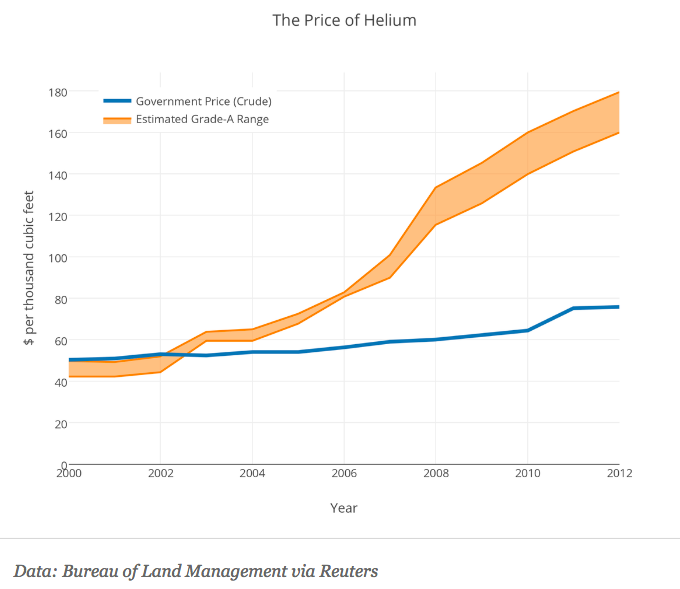Helium is a handy coolant, As a liquid at minus 452 degrees Fahrenheit and as an inert gas with tiny atoms, it is good for discovering leaks, and useful with combustible fuels. An invisible necessity, helium cools the magnets in MRI equipment, superconductors, and rocket fuel tanks. Years ago, when there was a chance we could have a helium shortage, someone suggested banning helium balloons because its other uses were so crucial.
Now shortages remain a worry.
Helium Markets
After deciding helium had military value during the 1920s, the U.S. government set up a National Helium Reserve and also restricted what private firms could export.
However, government had problems with prices. Sometimes the Reserve paid too much for helium and generated a sizable debt. But also, when they sold the helium at too low a price, its buyers wanted more while producers extracted less. One result of too much quantity demanded and too little supply were shortages.
Below you can see when the government price was far below the market approximately 11 years ago:

Now, the U.S. government is getting out of the helium business. Whereas privatization was supposed to have been completed by 2021, the new date is 2025. But they have made progress. During the end of January, the U.S. auctioned its underground helium stockpile in Texas. Acquiring 425 miles of pipelines and about 1 billion cubic feet of helium, the buyer will wind up with control of 30% of our country’s helium.
As a result, again, MRI providers are concerned about temporary shortages. They say adjusting to three states’ regulatory structure will take time. Also, the transaction did not include enrichment facilities that will have to be built or leased. Still, since helium evaporates after 35 to 48 days, buyers prefer a U.S. source rather than Qatar (and of course, Russia is not an option).
Our Bottom Line: The Power of the Market
Some say that so crucial a commodity as helium requires government oversight. However, stepping in, government distorts the market’s incentives. Citing the wisdom of the market, others believe that so crucial a commodity requires that government stay away. Only the power and wisdom of the market ensures appropriate price and quantity.
Citing Tanzania’s huge discovery, the market can also generate new reserves.
My sources and more: H/T to the BBC’s World Business Report for the Helium Reserve update. From there we looked back at a 2016 econlife post and at some helium history. But it was NBC that had the whole story of the pending sale and we also looked at Tanzania’s helium discovery, here and here.
Please note that several of today’s sentences were in a past econlife post.






